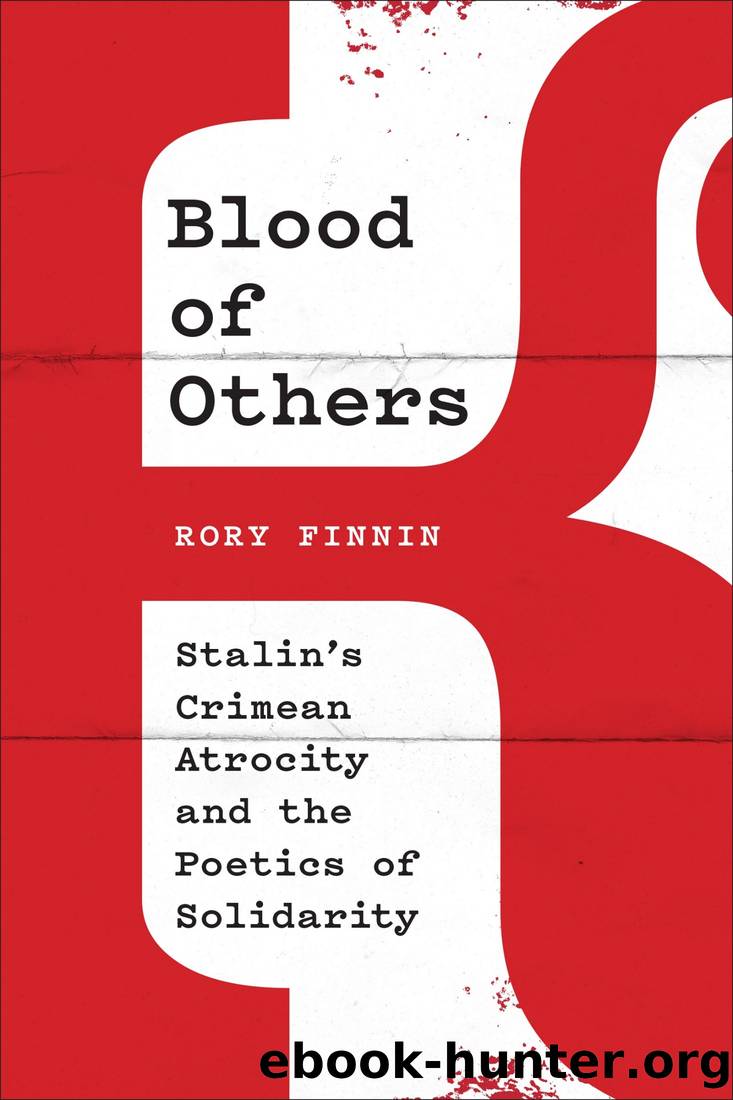Blood of Others: Stalin's Crimean Atrocity and the Poetics of Solidarity by Finnin Rory

Author:Finnin Rory [Rory, Finnin]
Language: eng
Format: epub
Tags: ADD SUBJECT
ISBN: 9781487507817
Google: 09mzzgEACAAJ
Publisher: University of Toronto Press
Published: 2022-04-07T20:48:47+00:00
In disputing the absurd literalism of the prosecutors, Dzhemilev echoes Russian writer Andrei Siniavsky but with more irreverence. In 1966 Siniavsky and Yuly Daniel were on trial for âanti-Soviet agitationâ; both were convicted and sentenced to terms in forced labour camps. In his âFinal Word,â Siniavsky insisted that âa word is not a deed, but a word; the artistic image is a thing of conventionâ (khudozhestvennyi obraz usloven).7 Dzhemilev may have mocked the authoritiesâ argument with a deft reductio ad absurdum, but his point was the same. Literature does not advance a series of propositions and truth claims; unlike âaccounting reports,â as he reminds us (incidentally echoing Samuel Beckett, who once declared that âliterary criticism is not book-keepingâ), poems do not aspire to concrete, determinate meaning or full disclosure.8 They are up to something else entirely.
In the Republic of Turkey, poems like Elçinâs âBahçesaray ÃeÅmesi,â which we will examine more closely next, intersected with novels and pulp-fiction âpenny dreadfulsâ to engage in a poetics of solidarity with the Crimean Tatars throughout the latter half of the twentieth century. Like the dissident Soviet works of the previous two chapters, these literary texts invite the reader to visualize the suffering victim and to grapple with a language of guilt, but their we-relation conceives of the Crimean Tatars very differently, as âpart of us,â as ethnic Sunni brethren enslaved by Soviet communism. They are presented as esir Türkler (captive Turks). Especially in conservative pan-Turkist literature, poetry and prose are put to work in the cause of their âliberationâ: poetry as incense, summoning the oral traditions of folk poetry as well as the rhetoric of religious sermons and litany, and prose as a drum, pounding images of graphic victimization and heroism into the mindâs eye.
The works of literature in this chapter, published under various censorship regimes, complicate the view that Turkey âignored the plightâ of the Crimean Tatars, as Alan Fisher posits, or failed to take âparticular interest in the plight of the Crimean Tatars,â as Isabelle Kreindler writes.9 Such neglect may have been true of a âpassiveâ elite in Ankara consumed by Cold War Realpolitik.10 But on the level of culture, especially popular culture, we encounter a much different picture. As we will see, it is a picture of pan-Turkist journals like Emel publishing poetry about Crimean Tatars alongside digests of Soviet samizdat and tamizdat for a Turkish readership, which included a Crimean Tatar diaspora population numbering as many as five million.11 It is a picture of millions of readers routinely entering into the perspective of dispossessed Crimean Tatars via the bestselling novels of Cengiz DaÄcı, which are a staple in Turkish secondary-school curricula today. Through Crimean Tatar characters, also described as âTurks,â tortured by both Stalinism and Nazism, DaÄcıâs novels offer readers âprosthetic memoriesâ of the Second World War, false-but-felt memories of a conflict that Turkey had avoided by declaring neutrality. The success of these novels in turn inspired epigones in the realm of pulp fiction, which found particularly receptive audiences and enthusiastic distributors in the Turkish military.
Download
This site does not store any files on its server. We only index and link to content provided by other sites. Please contact the content providers to delete copyright contents if any and email us, we'll remove relevant links or contents immediately.
4 3 2 1: A Novel by Paul Auster(12375)
The handmaid's tale by Margaret Atwood(7757)
Giovanni's Room by James Baldwin(7326)
Asking the Right Questions: A Guide to Critical Thinking by M. Neil Browne & Stuart M. Keeley(5759)
Big Magic: Creative Living Beyond Fear by Elizabeth Gilbert(5754)
Ego Is the Enemy by Ryan Holiday(5414)
The Body: A Guide for Occupants by Bill Bryson(5080)
On Writing A Memoir of the Craft by Stephen King(4935)
Ken Follett - World without end by Ken Follett(4723)
Adulting by Kelly Williams Brown(4565)
Bluets by Maggie Nelson(4547)
Eat That Frog! by Brian Tracy(4526)
Guilty Pleasures by Laurell K Hamilton(4439)
The Poetry of Pablo Neruda by Pablo Neruda(4097)
Alive: The Story of the Andes Survivors by Piers Paul Read(4018)
White Noise - A Novel by Don DeLillo(4002)
Fingerprints of the Gods by Graham Hancock(3996)
The Book of Joy by Dalai Lama(3976)
The Bookshop by Penelope Fitzgerald(3844)
